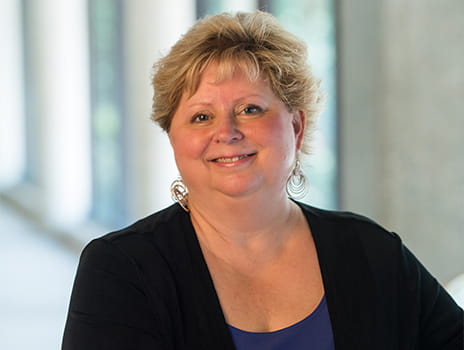Brain Tumor Patient Prevails

In recognition of the Christmas and New Year’s holidays, some of The University of Kansas Health System’s offices will have modified hours on Thursday, December 25, and Thursday, January 1.

For several years, Deborah Williams dealt with bouts of severe double vision, crossed eyes and weak muscles. She sought relief from the symptoms she believed were due to myasthenia gravis, an autoimmune neuromuscular disease that is seldom life-threatening.
Then in June 2013, with the help of ophthalmologist Thomas Whittaker, MD, the true culprit of Deborah's symptoms was revealed. She had a brain tumor.
Earlier that spring, Deborah nearly backed out of her regular appointment with Dr. Whittaker because of her extremely busy work calendar. She and her husband, Marvin, operate a popular Kansas City catering company that specializes in weddings and graduations.
"I really didn't have time to drive half an hour for that appointment," she says. "But I had recently been experiencing some balance problems and, in some way, felt like something wasn't quite right."
Dr. Whittaker told me, 'Deborah, I'm sorry to tell you that you have a brain tumor.' – Deborah Williams
"My instincts pushed me to go to that appointment," she continues. "Going in for my regular appointment with Dr. Whittaker was one of the best decisions of my life."
At the appointment, Deborah noticed her eye care team was performing more tests on her than usual. Then Dr. Whittaker asked her to cover her left eye, and all she could see was a thick, gray rectangle shape blocking her vision.
"Dr. Whittaker told me, 'Deborah, I'm sorry to tell you that you have a brain tumor,'" she recalls. He then referred her to The University of Kansas Hospital's neurosciences program, where she met with neurosurgeon Roukoz Chamoun, MD.
"I immediately trusted Dr. Chamoun and was comforted by his soft-spoken manner," she says.
"Deborah's tumor was very invasive," says Dr. Chamoun. "When I looked at the MRI, it was obvious the tumor could not be completely removed. However, that does not mean we could not help her, minimize the damage and improve her quality of life."
Dr. Chamoun and his team planned to perform surgery to remove part of the tumor and relieve pressure on her optic nerve and brain. Because the tumor was wrapped around the optic nerve of her right eye, Deborah learned she would have an equal chance of decreased vision in that eye, no change in vision or improved vision.
Fortunately, the tumor appeared to be slow-growing and benign, but the tissue would be tested after surgery to ensure it was not cancerous.
Deborah's surgery lasted 7 hours and went as planned. Tests verified that the tumor was benign. The next day, she was walking laps around her patient care unit and left the hospital soon after.
"In every way possible," Deborah says, "the hospital, doctors and nursing staff took amazing care of me. They communicated so well with my family and were cheerful, compassionate, kind and professional."
With her husband and the staff at her catering company rallying around her, Deborah was able to work from home and fulfill all the dates on their hectic work calendar. "It wasn't a picnic," she says. "But it definitely didn't slow me down for long!"
Above all, Deborah is grateful to be thriving. She continues to see Dr. Chamoun for follow-up care to detect any further growth in the tumor. She has recovered some of the vision in her right eye and is able to drive, work and live the life she loves.
"I am so deeply appreciative of the excellent treatment I received from Dr. Chamoun and his team, along with the staff that took care of me," she says. "I could not have been placed in better hands. To be able to change someone's life the way Dr. Chamoun changed mine is nothing but miraculous. I feel like the luckiest person in the world."

Our progress – and the progress of healthcare in our city and region – depends on the generosity of people like you. Because of such generosity, we're able to expand programs and treatments that save lives. And by giving, we can accelerate our ability to help those who need it most.